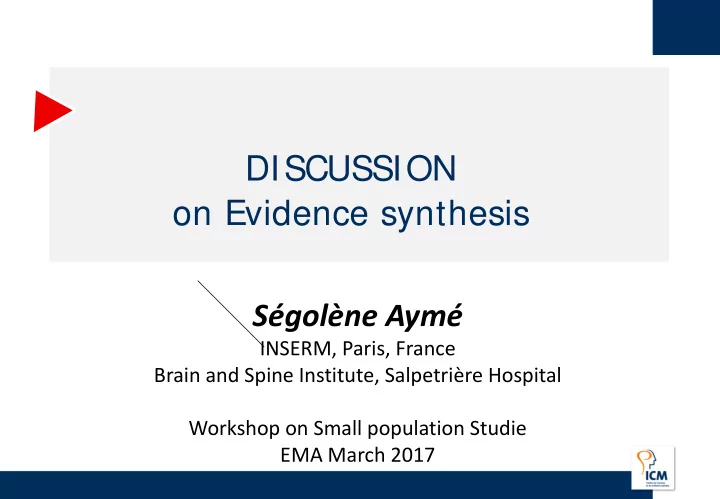

DISCUSSION on Evidence synthesis Ségolène Aymé INSERM, Paris, France Brain and Spine Institute, Salpetrière Hospital Workshop on Small population Studie EMA March 2017
The Community of rare diseases has a long history of close collaboration between stakeholders to identify solutions to problem caused by rarity
ECRD ECRD ECRD ECRD ECRD ECRD Paris Brussels Berlin Luxembourg Lisbon Krakow Austrian UK Strategy Plan Lithuanian Plan Bulgarian German Danish Plan Plan Strategy Slovenian Plan French Czech Finnish Greek Dutch Plan Plan Programme Strategy Plan Slovakian Strategy Swiss Spanish Latvian Plan National Strategy Cyprus’ Concept Plan Portuguese Belgian Plan Irish French Plan Plan Plan 2 Hungarian Romanian Plan Council Plan IRDiRC Recommendation Italian Plan Cross-Border Orphanet Healthcare Directive EC Europe Croatian Communication Programme EC EG RD EUCERD RDTF EU OMP Regulation Member States’ policy EU policy defined Establishment of Development of a infrastructures community of stakeholders 2010 2012 2006 2008 2014 2000 2002 2004
National Centres of Expertise and ERN Recommendations on Quality Criteria for National Centres of Expertise Recommendations on European Reference Networks between Centres
Establisment of ERN Cost-effective use of resources Need for highly specialised healthcare Centres demonstrating: Competence and experience specific human resources structural and equipment resources appropriate organisation
Scope of 22 European Networks for RD Rare Skin Disorders Rare Eye Diseases Rare Bone Disorders Rare Diseases of the Heart Rare craniofacial anomalies and ENT Rare Hereditary Metabolic Disorders disorders Rare Hematological Diseases Rare Congenital Malformations and Rare Hepatological Diseases Rare Intellectual Disability Rare Connective Tissue and Rare inherited and congenital Musculoskeletal Diseases anomalies Rare Immunodeficiency, Rare Endocrine Conditions Autoinflammatory and Autoimmune Rare Kidney Diseases Reference Diseases Network Rare Multisystemic Vascular Diseases Rare Neurological Diseases Rare Adult Cancers (solid tumors) Rare Neuromuscular Diseases Paediatric Cancer Rare and Complex Epilepsies Genetic Tumour Risk Syndromes Rare Respiratory Diseases
Dissemination of Information WWW.ORPHA.NET
Dissemination of political and scientific information • 20 issues yearly • 25,000 readers • Political news • Scientific news
Codification of Rare Diseases Rare Diseases will be in ICD 11 to be published in 2018 Release by Orphanet of an Inventory of Rare Diseases with classification Multiple hierarchies Linearisations by specialty Recommendation of the Expert Group on RD to use the Orphanet nomenclature in health information systems
Support to the establishment of Disease Registries Registries are key element of national plans/strategies Need for disease registries For clinical research purpose For monitoring interventions Need to code rare diseases in electronic health records
Funding of R&D since 2000 1829 ongoing national or international clinical trials for 828 diseases in 29 countries (Orphanet data – December 2016) Percentage of clinical trials by category 0% 2% 2% 2% 2% Drug clinical trial 16% Protocol clinical trial Cell therapy clinical trial Gene therapy clinical trial Medical device trial Vaccine clinical trial other 76%
Key role played by > 2,300 Patient organisations Very articulate and knowledgeable patients Involved at all level from Research to Services and in regulatory and political processes Coordinated by EURORDIS in Europe Organised at country level
Conclusion Very dedicated community Progresses go in the right direction Far too slow for patients Major inequality between countries New experiment of healthcare organisation Partnership between countries Pragmatism and proactivism
Data are accumulated but not analized Chronic diseases mean stages with different mechanisms Markers of evolution +++ Multi criteria analysis More efforts on analysis (open access) More money on exploitation than collection
CONCLUSI ON Learn more from experience Workshop on past trial designs by homogenous group of diseases Trials cannot be the first attempt to document the natural history More pragmatism to deliver for patients
You are under scrutinity
Recommend
More recommend